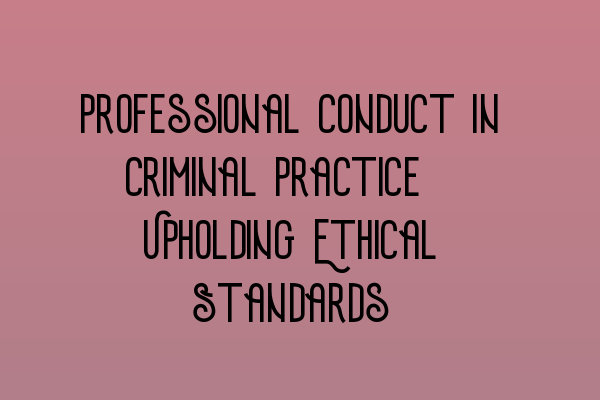Professional Conduct in Criminal Practice: Upholding Ethical Standards
As criminal law solicitors, we have a responsibility to uphold the highest ethical standards in our professional conduct. The trust and confidence that our clients place in us must be safeguarded at all times. This blog post aims to shed light on the importance of maintaining ethical practices in criminal law and the potential consequences of failing to do so.
Integrity and Confidentiality
Integrity is a core value that lies at the heart of our criminal justice system. We must always act honestly, fairly, and with integrity in our interactions with clients, colleagues, and the courts. Upholding client confidentiality is crucial, as it ensures that clients can trust us with sensitive information without fear of disclosure.
By maintaining high standards of integrity and confidentiality, we build strong relationships with our clients, ensuring open and honest communication. This fosters trust and enables us to effectively represent our clients’ interests.
Conflict of Interest
Avoiding conflicts of interest is essential in criminal practice. We must ensure that we do not represent multiple clients whose interests may be at odds with each other. Additionally, we should not represent clients in cases where we have personal or financial interests that could compromise our objectivity.
Identifying and managing potential conflicts of interest is crucial to uphold the integrity of our profession. By doing so, we protect the interests of our clients, maintain our professional credibility, and avoid any allegations of impropriety.
Competence and Diligence
In criminal practice, we must continuously strive to enhance our knowledge and skills to provide competent representation to our clients. Staying up to date with changes in the law, attending relevant training courses, and seeking professional development opportunities are essential for maintaining competence.
Diligence is equally important. We must handle every case entrusted to us with care, thoroughness, and promptness. By diligently investigating the facts, cross-examining witnesses, and preparing strong legal arguments, we can provide our clients with the best possible defense.
Professional Misconduct and Consequences
Professional misconduct in criminal practice can have severe repercussions. It can damage our professional reputation, undermine the trust of clients and colleagues, and result in disciplinary action by regulatory bodies.
To ensure our conduct aligns with ethical standards, it is essential to familiarize ourselves with the Solicitors Regulation Authority (SRA) Code of Conduct. This code outlines the expected behaviors and responsibilities of solicitors, providing guidance on maintaining professional integrity and avoiding misconduct.
Should a complaint be made against us, the SRA has the power to investigate and take action if they find evidence of misconduct. Consequences may include fines, suspension, or even disbarment, which can be detrimental to our careers and livelihoods.
Ultimately, ethical conduct in criminal practice is not only a moral obligation but also a professional duty. By upholding these standards, we ensure the administration of justice remains fair, transparent, and credible.
